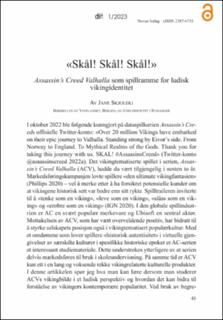| dc.contributor.author | Skjoldli, Jane | |
| dc.date.accessioned | 2023-10-24T12:23:36Z | |
| dc.date.available | 2023-10-24T12:23:36Z | |
| dc.date.created | 2023-09-11T13:26:26Z | |
| dc.date.issued | 2023 | |
| dc.identifier.citation | Skjoldli, J. (2023) «Skål! Skål! Skål!»: Assassin’s Creed Valhalla som spillramme for ludisk vikingidentitet. DIN - Tidsskrift for religion og kultur, (1), 41-75. | en_US |
| dc.identifier.issn | 1501-9934 | |
| dc.identifier.uri | https://hdl.handle.net/11250/3098433 | |
| dc.description.abstract | I oktober 2022 ble følgende kunngjort på dataspillserien Assassin’s Creeds offisielle Twitter-konto: «Over 20 million Vikings have embarked on their epic journey to Valhalla. Standing strong by Eivor’s side. From Norway to England. To Mythical Realms of the Gods. Thank you for taking this journey with us. SKAL! #AssassinsCreed» (Twitter-konto @assassinscreed 2022a). Det vikingtematiserte spillet i serien, Assassin’s Creed Valhalla (ACV), hadde da vært tilgjengelig i nesten to år. Markedsføringskampanjen lovte spillere «den ultimate vikingfantasien» (Phillips 2020) – vel å merke etter å ha forsikret potensielle kunder om at vikingene historisk sett var bedre enn sitt rykte. Spilltraileren inviterte til å «tenke som en viking», «leve som en viking», «slåss som en viking» og «erobre som en viking» (IGN 2020). I den globale spillindustrien er AC en svært populær merkevare og Ubisoft en sentral aktør. Mottakelsen av ACV, som har vært overveldende positiv, har bidratt til å styrke selskapets posisjon også i vikingtematisert populærkultur. Med et omdømme som lover spillere «historisk autentisitet» i virtuelle gjengivelser av særskilte kulturer i spesifikke historiske epoker er AC-serien et interessant studiemateriale. Dette understrekes bare av at serien delvis markedsføres til bruk i skoleundervisning. På samme tid er ACV kun ett av en lang og voksende rekke vikingrelaterte kulturelle produkter. I denne artikkelen spør jeg hva man kan lære dersom man studerer ACVs vikingbilde i et ludisk perspektiv og hvordan det kan bidra til forståelse av vikingers kontemporære popularitet. | en_US |
| dc.description.abstract | In October 2022, Ubisoft’s official Twitter account for their highly popular digital game series Assassin’s Creed (Ubisoft 2007–; hereafter AC) proclaimed triumphantly that «[o]ver 20 million Vikings have embarked on their epic journey to Valhalla. Standing strong by Eivor’s side. From Norway to England. To Mythical Realms of the Gods. Thank you for taking this journey with us. SKAL! #AssassinsCreed» (Twitter-konto @assassinscreed 2022a). At the time, the Viking-themed installation in the series, Assassin’s Creed Valhalla (Ubisoft 2020; hereafter ACV), had been available for almost two years. Ubisoft’s pre-release marketing campaign had promised players «the ultimate Viking fantasy» (Phillips 2020), after assuring potential customers that the Vikings historically speaking were better than their reputation. The game trailer invited players to «think like a Viking», «live like a Viking», «fight like a Viking», and «conquer like a Viking» (IGN 2020). In the global games industry, AC is a highly popular brand and Ubisoft a central supplier. The reception of ACV, which has been overwhelmingly positive, has strengthened the company’s position in Viking-themed popular culture. With a reputation for offering “historical authenticity” by means of virtual reconstructions of specific cultures in specific historical eras, the AC series is an interesting object of study. This is all the more underscored by the fact that the series is partly marketed for use in education. At the same time, ACV is only one of a long and growing list of Viking-related cultural procuts. In this article, I ask what we can learn by studying ACV’s Viking image in a ludic perspective, and how that approach may contribute to our understanding of the contemporary popularity of Vikings. Employing the terms Viking power, Viking identity, and Viking spirituality, I hope to offer tools for understanding the complex field that is the use of Vikings and the Norse past today. | en_US |
| dc.language.iso | nob | en_US |
| dc.rights | Navngivelse-DelPåSammeVilkår 4.0 Internasjonal | * |
| dc.rights.uri | http://creativecommons.org/licenses/by-sa/4.0/deed.no | * |
| dc.subject | ludisk vikingidentitet | en_US |
| dc.subject | Assassin’s Creed Valhalla | en_US |
| dc.subject | viking identity | en_US |
| dc.title | «Skål! Skål! Skål!»: Assassin’s Creed Valhalla som spillramme for ludisk vikingidentitet | en_US |
| dc.title.alternative | ‘Drink! Drink! Drink!’: Assassin’s Creed Valhalla as a play frame for ludic viking identities. | en_US |
| dc.type | Peer reviewed | en_US |
| dc.type | Journal article | en_US |
| dc.description.version | publishedVersion | en_US |
| dc.subject.nsi | VDP::Humaniora: 000::Teologi og religionsvitenskap: 150 | en_US |
| dc.source.pagenumber | 41-75 | en_US |
| dc.source.journal | DIN - Tidsskrift for religion og kultur | en_US |
| dc.source.issue | 1 | en_US |
| dc.identifier.cristin | 2173999 | |
| dc.relation.project | Norges forskningsråd: 301273 | en_US |
| cristin.ispublished | true | |
| cristin.fulltext | original | |
| cristin.qualitycode | 1 | |

